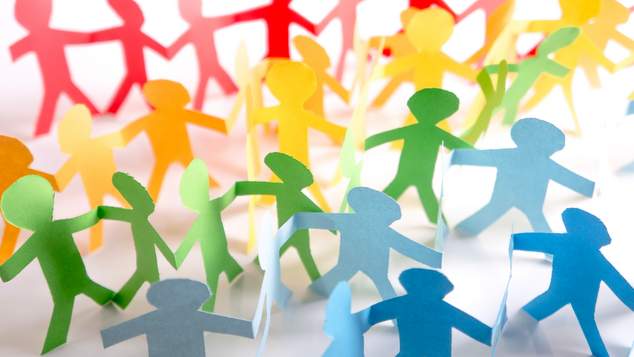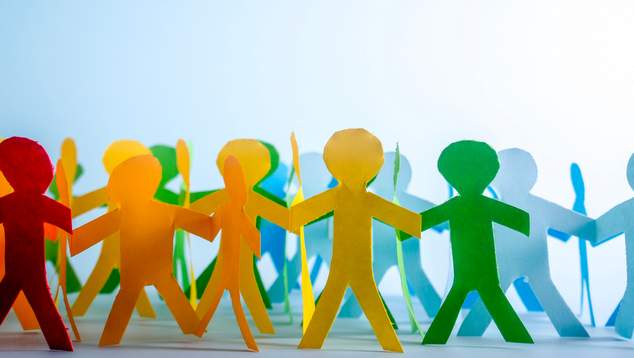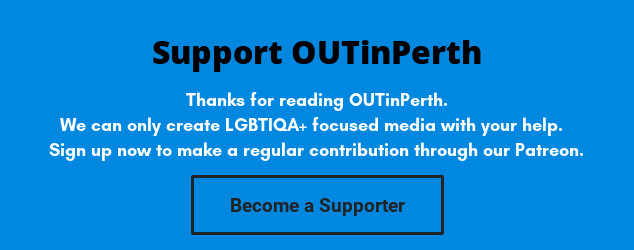OPINION: Dr Sharon Dane, Brian Greig, Rodney Croome
Independent, accountable and courageous: Our blueprint for a national LGBTI human rights organisation
The formation of a new national LGBTI human rights organisation is always a moment of hope.
We know because we have been involved in every such organisation since the early 90s, including the Australian Council for Lesbian and Gay Rights, the Equal Rights Network and Australian Marriage Equality.
We are keenly aware of the need for national organisation, deeply committed to having one, and understand the pitfalls all too well.
We want a national organisation, but we want it to belong to the LGBTI community, to be accountable to that community, and to push for what that community wants, not what powerful interests prefer to grant it.
We were pleased to see the launch of Equality Australia because it means networks and databases from the marriage equality campaign will continue to be used for LGBTI equality.
We were particularly pleased to see Equality Australia will be properly funded. A lack of funding was a primary reason previous national organisations folded.
But the launch of Equality Australia has left us with several pressing questions. We believe asking these questions will help ensure a strong national voice for LGBTI equality.
Democratic accountability: How will Equality Australia act on the wishes of the LGBTI community?
The Equality Campaign from which Equality Australia arose was not a grassroots community organisation. It was formed when the self-appointed committee of Australians 4 Equality joined forces Australian Marriage Equality.
This is one reason the Equality Campaign veered away the wishes of the LGBTI community on two key issues: It urged resignation to a plebiscite when the LGBTI community was against one under all circumstances, and it championed compromises in the final marriage bill that left Australia with the worst marriage “equality” legislation in the world despite the LGBTI community strongly opposing this compromised legislation.
The Equality Campaign has also been criticised for failing to protect vulnerable LGBTI people during the postal survey because it refused to counter the No campaign’s fear-mongering.
It is true that the Equality Campaign conducted “stakeholder meetings” but these meetings were generally stage-managed. The Equality Campaign would simply outline its campaign rather than allow the broader LGBTI community any real input to that campaign.
We don’t want to see Equality Australia go down the same path. We hope it will be upfront about whether it has a board, who’s on that board, how they are appointed, whether there will be a membership and elections, how the LGBTI community will be consulted, how minorities within the LGBTI community will be represented and consulted, and how decisions are made on policy, staff and budgets.
In this, we echo the concerns of leading LGBTI law expert, Alastair Lawrie, who says Equality Australia
should be clear about:
“Its membership structure, including whether/how LGBTI people can join or become involved, and how it will ensure it represents views across our diverse communities.”
We also echo LGBTI community research conducted earlier this year by PFLAG and just.equal which found LGBTI people overwhelmingly want a national organisation that is accountable to the LGBTI community (see below).
Equality Australia must take a very different course from the Equality Campaign.
It must consult with, be accountable to, and be transparent before the LGBTI community.
Its goals, and the paths it takes to achieve those goals, must be guided by the LGBTI community as a whole.
It must also have mechanisms in place to ensure vulnerable members of the LGBTI community have their voices heard and their needs considered.
We would like to know how it will do this?
Staying in touch: surveying the LGBTI community
One way for LGBTI human rights groups to ensure their campaigning is in tune with the LGBTI community is through regular surveys.
Just.equal and PFLAG have been surveying the LGBTI community consistently since 2016.
Our surveys use multi-modal recruitment strategies to ensure the sample is large and broadly representative.
The surveys ask LGBTI people not only about their priorities but also strategic questions like what compromises are acceptable and what paths to reform we should follow.
We were pleased to see the Equality Campaign recently run a survey about the priorities of LGBTI people that will hopefully inform Equality Australia’s campaign.
We would like to know if such surveys will be regular, how they will inform Equality Australia’s campaigning and if questions about strategy will also be included.
Goal setting: How will Equality Australia determine its priorities?
The Equality Campaign, and the Human Rights Law Centre which worked closely with it, have records of engaging on reforms only when these reforms begin to become likely or when there was little resistance from anti-LGBTI groups.
The Equality Campaign only formed when marriage equality already had majority support in the community and in parliament.
The Human Rights Law Centre has generally taken up LGBTI reforms when there has been relatively low level of political resistance from anti-LGBTI groups and conservative politicians, or when momentum is with reform. Examples include expungement of gay criminal records and transgender forced divorce.
We’re not saying these reforms aren’t important or sometimes controversial. Of course they are. We’re saying that good LGBTI advocacy deals with more difficult issues as well. Otherwise, it looks like we are only asking politicians for what they are willing to give. It looks like we are pushing against open doors.
We welcome Equality Australia’s commitment to important issues currently in the news like banning discrimination against LGBTI students in religious schools.
But what about LGBTI teachers in faith-based schools? What about clients and staff of other faith-based hospitals and charities? What about gender markers on birth certificates? What about offensive language laws? What about the on-going debate about criminalising conversion therapy? What about gay and bisexual blood donation?
We believe national LGBTI human rights organisations should campaign to raise up hard reforms, not just nudge easier ones over the line.
We are keen to know if Equality Australia will do this.
Independence: How will Equality Australia ensure it is free from influence by big politics and big money?
In the past, some state-based LGBTI rights groups have become Labor puppets. Australians 4 Equality was set up by gay corporate executives and wealthy donors who had significant influence over the group’s decisions.
We were concerned to see that reporting of the announcement of Equality Australia focussed entirely on the Equality Australia’s criticism of the Prime Minister and the Liberal Party. Yet, if Labor wins the next election, it will also need to be subject to scrutiny and criticism by Equality Australia whenever warranted.
We want Equality Australia to be, and to be seen to be, completely independent. We are keen to know how it will ensure it isn’t co-opted by powerful political and monied interests and instead represents the aspirations of the LGBTI community regardless of those interests.
Relationships: How will Equality Australia relate to state-based and issue-based groups?
One of the biggest problems for previous national LGBTI human rights organisations was their relationships to state-based rights groups, national networks like PFLAG and Rainbow Families, and groups specific to particular issues and identity groups.
It is vital that these groups are able to pursue their own priorities respected and aided by a national organisation, not controlled or limited by it.
We are concerned that Equality Australia seemed not to have formally reached out to organisations already operating at a state or federal level before its formation was announced.
We would like to see Equality Australia now sit down with other state and federal LGBTI rights groups to ensure everyone knows about and respects each other’s work. We are pleased it has begun to reach out to some individuals and organisations.
Beyond that, we are keen to know how Equality Australia will ensure it works with and not against local and issue-specific groups?
A new campaign ethic: Independent, accountable and courageous
We understand no initiative is perfect and LGBTI community organisations often have to act in an ad hoc way because we have a relatively short history of building community institutions. It would also be fair if others were to ask “how accountable are you three?”
We believe the ground has shifted thanks to the postal survey. It showed that how we reach equality is as important as equality itself. It reminded us that the ends do not always justify the means. It showed the need for the highest standards in our campaigning.
In particular, it showed that LGBTI human rights campaigns need to be tethered to the express wishes of the LGBTI community.
That’s why groups we are involved in like just.equal and Equality Tasmania now survey the LGBTI community on its views (see more about this above).
Our campaigning is now founded on the wishes of the LGBTI community as expressed in regular surveys.
Importantly, the aim of the research is not to confirm our existing views but to identify the community’s wishes, which may at times run counter to what we expect.
We hope Equality Australia will agree that it’s time for LGBTI equality campaigning that is more open, accountable, independent, consultative, democratic, and, above all, courageous.
National organising: what the LGBTI community says it wants
Earlier this year PFLAG and just.equal conducted a large-scale, comprehensive and broadly representative national survey on the law reform and policy priorities of the LGBTI community. The survey also asked LGBTI people their views on
1. how resources should be allocated for national advocacy and lobbying, and
2. what shape a funded LGBTI human rights national organisation should take.
In response to question 1, respondents gave a higher priority to funding for existing groups and services rather than funding for a new national human rights organisation.
In response to question 2, the top priorities for a national human rights organisation were that
a) it should guarantee the interests of smaller population groups with the LGBTI community including (e.g. transgender, intersex, Indigenous and CALD, regional and rural, small states and territories), and
b) that it should it should have a broad membership base to which the board is accountable.
There was substantially less support for an organisation without a membership base that is run by a self-perpetuating committee.
Dr Sharon Dane is a social psychology researcher and a former national convener for Australian Marriage Equality
Brian Greig OAM is a former WA Democrat Senator and former WA convener for Australian Marriage Equality
Rodney Croome AM is a former national director of Australian Marriage Equality and current spokesperson for Equality Tasmania (formerly the Tasmanian Gay and Lesbian Rights Group)
GOT AN OPINION?
Got something you’d like to share with the rest of the community? Send your opinion piece to editor@outinperth.com and we’ll consider it for publication.







